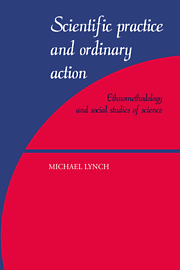Book contents
- Frontmatter
- Contents
- Acknowledgments
- Introduction
- 1 Ethnomethodology
- 2 The demise of the “old” sociology of science
- 3 The rise of the new sociology of scientific knowledge
- 4 Phenomenology and protoethnomethodology
- 5 Wittgenstein, rules, and epistemology's topics
- 6 Molecular sociology
- 7 From quiddity to haecceity: ethnomethodological studies of work
- Conclusion
- Name index
- Subject index
6 - Molecular sociology
Published online by Cambridge University Press: 03 December 2009
- Frontmatter
- Contents
- Acknowledgments
- Introduction
- 1 Ethnomethodology
- 2 The demise of the “old” sociology of science
- 3 The rise of the new sociology of scientific knowledge
- 4 Phenomenology and protoethnomethodology
- 5 Wittgenstein, rules, and epistemology's topics
- 6 Molecular sociology
- 7 From quiddity to haecceity: ethnomethodological studies of work
- Conclusion
- Name index
- Subject index
Summary
Conversation analysis (CA) is the most sustained and coherent research program that has developed out of ethnomethodology. Since the late 1960s, researchers in the field have produced a steady accumulation of technical studies that have built on one another's findings. These studies have been published in numerous edited collections and professional journals in sociology, linguistics, communication studies, and anthropology. Although CA is by no means a dominant program in any of these disciplines, it is moderately well established, and it has been praised as a rare example of a “normal science” research program in sociology.
In this chapter, I critically examine some programmatic claims for CA's status as a scientific discipline, and I argue that a “mythological” conception of natural science has become entrenched in the CA's observation language and in its conventions for presenting data and disseminating analytic reports. Like many other social scientists, conversation analysts often espouse a conception of unified scientific method that is now widely criticized in the history, philosophy, and sociology of science. Just as the new sociology of scientific knowledge provided a basis for criticizing the Kaufmann-Schutz version of science in Chapter 4, so can it enable a critical review of some of CA's assumptions about how a natural observational science can be implemented in the human sciences. My aim in this chapter, however, is not just to criticize yet another scientistic research program but to suggest how some of CA's programmatic initiatives and exemplary studies can be reincorporated into a “postanalytic” line of ethnomethodological research that remains indifferent to the allure of science and the pitfalls of scientism.
- Type
- Chapter
- Information
- Scientific Practice and Ordinary ActionEthnomethodology and Social Studies of Science, pp. 203 - 264Publisher: Cambridge University PressPrint publication year: 1994
- 1
- Cited by

